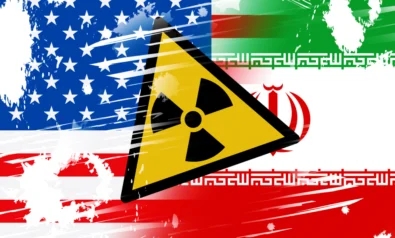In an article on Fair Observer that attempts to analyze the latest developments inside Iran, Irina Tsukerman not only claims to understand a truth the rest of the media apparently have no access to, but in the subtitle to the article reveals her ideological bias: “A witch-hunt against real or imaginary spies is a sign of desperation in Iran’s ruling circles.”
Witch-hunt happens to be one of US President Donald Trump’s favorite tropes, one he has repeatedly used to dismiss the findings of the Mueller report. Just this past week, Trump regaled his Twitter followers with a reminder of his obsessive belief that he’s the victim of a witch-hunt. He begins his surprising complaint about Fox News being unfair to him with this reminder: “Even considering the fact that I have gone through a three year vicious Witch Hunt, perpetrated by the Lamestream Media in Collusion with Crooked and the Democrat Party…” to brand as fake news the results of a Fox News poll that showed him trailing Joe Biden.
Tsukerman is certainly right to describe Iran’s rulers as increasingly desperate, but she should realize that, even when faced with terrifying circumstances, the Iranians — who have been playing the game for the past 1,500 years — have a chess player’s understanding of both war and diplomacy. Her analysis would have benefited from a more subtle strategic deconstruction that seeks to penetrate the logic of a grand master, rather than following the simplistic logic of a real-estate bully who believes that all human and political relations can be reduced to forcing a “deal.”
The author for the most part accurately describes the sequence of events that have led to the current showdown, but she occasionally substitutes unjustified innuendo for facts. Her adherence to the US administration’s theses — crafted by the factually unreliable if not downright unholy trio of Donald Trump, John Bolton and Mike Pompeo — becomes evident when she claims: “The United States, for its part, has conducted itself with unusual restraint.” The only truth to be found in this sentence comes from the fact that, in Trump’s White House, restraint itself is unusual.
Here is today’s 3D definition:
Restraint:
In the context of 21st-century history, when referring to US foreign policy, a term to be applied to any act or series of acts — including crippling economic sanctions, illicit pressure and various forms of subterfuge — that fall short of military invasion and all-out prosecution of war
Contextual Note
Tsukerman cites as a reason to explain Trump’s commitment to restraint the fact that “the United States is in the midst of a hotly contested election year,” which should of course be amended to a year-and-a-half election cycle. She is correct, however, in thinking that Trump would be wise, from a purely electoral point of view, to avoid going to war. He had time to see the effect it had on George W. Bush, the proud “war president” whose short-term electoral success (in 2003-04) was followed by catastrophic failure during his second term. On the other hand, panicked leaders may always be tempted to be the tail to “wag the dog” if they can get their timing right in the runup to an election.
Tsukerman did mention one telling fact that would have been worth exploring when she noted that “half of Americans expect a war with Iran ‘in the next few years.’ Yet only a third of those polled want to see military action against Iran.” This would appear to indicate two things: that most Americans don’t believe Trump is likely to show the restraint she is counting on him to show; and that whenever tensions rise anywhere overseas, US citizens expect that the government will go to war, despite public opinion.
The author’s most surprising distortion occurs when she writes, “if the administration, as many believe, is on course to court a new and ‘better’ nuclear deal with Tehran…” and provides a link to a Politico article that states the opposite: “Trump wants a new nuclear deal with Iran. No one else does.” A Trumpian ploy if ever there was one: insist on the contrary of an obvious truth and people will believe you.
By calling Iran’s actions a witch-hunt, Tsukerman assumes that the “spies” the Iranians have arrested are not spies. She may be right but presents it as an affirmation with no evidence to support it.
Time magazine, on the other hand, reports the explanation given by an Iranian official without suggesting there is a reason to doubt its truth: “The Iranian Intelligence Ministry has detected an uptick in U.S. efforts to recruit spies in Iran since the election of President Donald Trump in 2016 and the appointment of Gina Haspel as director of the CIA last year, the official said.”
USA Today, following the same story, notes that there “ was no immediate reaction from the CIA, which rarely comments on its national security activities,” but the CIA does emphatically deny many of its actions, even in Iran, when it believes it can credibly do so.
The Washington Post quotes Alex Vatanka, a senior fellow at the Middle East Institute: “There is no doubt Iran has been and remains a top target for U.S. spy agencies.” In other words, the spies are there and active. But are they the ones Iran has arrested? Tsukerman believes they are not, but has no evidence for the claim.
Historical Note
Most observers of geopolitics would find it hard to deem US actions in the Middle East restrained. Surrounding faraway nations with military bases to facilitate aggressive intimidation and apply crippling sanctions, while abetting — against the will of the US Congress — a despotic neighboring nation (Saudi Arabia) in provoking the humanitarian disaster that has been taking place in Yemen, these are hardly what one would call examples of “restraint.” From a purely historical perspective, they appear to be the opposite: a demonstration of the inability of a powerful nation with a taste for empire to refrain from interfering not just in the politics of another nation, but assaulting the well-being and stability of its population.
Tsukerman goes further, bordering on the delusional: “The drama of the US being on the brink of war has been largely created to keep the US out of the Gulf, through a mass-scale psy-op of fearmongering.” But the US is well ensconced in the Gulf and has never considered leaving it.
She even repeats discredited slanders against the National Iranian American Council (NIAC), calling it the “unregistered pro-regime Iranian lobby in Washington.” She accuses it of having “crafted” the unthinkable suggestion, now widely echoed in the media, that the US may engage in war, which she calls “fearmongering.”
Tsukerman appears to cling to the belief that the US abhors war and avoids it at all costs. But everyone remembers Vietnam, Kosovo, Afghanistan, Iraq and Libya, to mention only those obvious cases. She seems to believe Trump is different from all the previous presidents, who went to war for reasons that seemed less obvious than the current situation with Iran. She may even entertain the belief that Trump is “a stable genius” who is unlikely to do anything rash, though she won’t find many rational people who agree with that assessment.
Whether Trump is stable or permanently untethered, a genius or a dolt, no one could doubt that the tenant of the White House is a special case. Perhaps Tsukerman suspects that Trump’s very evident rashness means that, unlike previous presidents, he won’t be cowed into reflexively following the logic imposed by a military-industrial complex, a tentacular institution that, if only for commercial reasons, needs occasions to deploy and test its weapons in real theaters of war. In other words, thanks to his lack of restraint, President Trump may show restraint. That’s a paradox to meditate on… but, alas, not to count on.
Given what everyone can see about Trump’s behavior, Tsukerman might therefore find it useful, as she hones her own art of punditry, to learn to show some real restraint when claiming to know the hidden truth about both the US and Iran.
*[In the age of Oscar Wilde and Mark Twain, another American wit, the journalist Ambrose Bierce, produced a series of satirical definitions of commonly used terms, throwing light on their hidden meanings in real discourse. Bierce eventually collected and published them as a book, The Devil’s Dictionary, in 1911. We have shamelessly appropriated his title in the interest of continuing his wholesome pedagogical effort to enlighten generations of readers of the news.]
The views expressed in this article are the author’s own and do not necessarily reflect Fair Observer’s editorial policy.
Support Fair Observer
We rely on your support for our independence, diversity and quality.
For more than 10 years, Fair Observer has been free, fair and independent. No billionaire owns us, no advertisers control us. We are a reader-supported nonprofit. Unlike many other publications, we keep our content free for readers regardless of where they live or whether they can afford to pay. We have no paywalls and no ads.
In the post-truth era of fake news, echo chambers and filter bubbles, we publish a plurality of perspectives from around the world. Anyone can publish with us, but everyone goes through a rigorous editorial process. So, you get fact-checked, well-reasoned content instead of noise.
We publish 2,500+ voices from 90+ countries. We also conduct education and training programs
on subjects ranging from digital media and journalism to writing and critical thinking. This
doesn’t come cheap. Servers, editors, trainers and web developers cost
money.
Please consider supporting us on a regular basis as a recurring donor or a
sustaining member.
Will you support FO’s journalism?
We rely on your support for our independence, diversity and quality.














